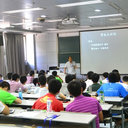Fabrication of Stable and Self-Assembling Rapeseed Protein Nanogel for Hydrophobic Curcumin Delivery.
Nøgleord
Abstrakt
Food-dervied biopolymer nanogels have recently received considerable attention as favorable carrier systems for nutraceuticals and drugs. In the present study, new biocompatible and self-assembled acylated rapeseed protein isolate (ARPI)-based nanogels were fabricated for potential hydrophobic drug delivery by chemical acylation and heat-induced protein denaturation. The effects of the ARPI concentration, pH, heat temperature, and heat time on the physiochemical properties of self-assembled ARPI nanogels were investigated. The optimized ARPI nanogels were characterized by a hydrodiameter of 170 nm in size, spherical morphology, and light core-dark shell structure. In comparison to native rapeseed protein isolates and ARPI without the heat treatment, ARPI nanogels as a result of dual acylation and heat processes exhibited significantly altered spatial secondary and tertiary structures, increased surface hydrophobicity, and decreased free sulfhydryl contents of the protein. Such properties endow amphilic ARPI with the self-aggregating ability, resulting in the hydrophobic core with formations of covalent disulfide bonds and the hydrophilic shell with succinyl moieties exposed to the water side. Such a cross-linked structure allowed for ARPI nanogels to be resistant against a broad array of pH and ionic strength as well as lyophilization and dilution. ARPI nanogels demonstrated 95% encapsulation efficiency of hydrophobic compound curcumin and significantly increased its anticancer activity against multiple cancer cell lines.


